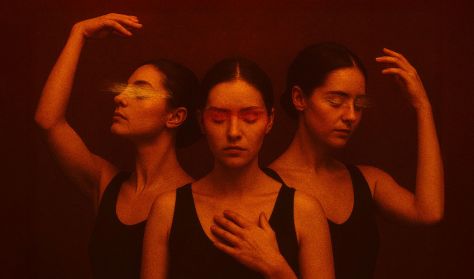The birth of desire also brings with it tension and uncertainty. It evokes a unique experience of discovery for man and woman. The live music and the prose reflect on the intimate and fragile relationship in the form of an inner monologue.
The dynamics of passion, attachment, and possession embody the duality of love, symbolising the constant alternation of attraction and tension. Through the weight of the bond between man and woman, the jealousy, the clinging to each other, and the boundaries between autonomy, they evoke the darker tones of Márai’s work. Love is not only harmony and happiness, it is also a struggle, where finding the balance between intimacy and autonomy is one of the greatest challenges.
The silence of passing and of loneliness depicts the invisible bonds of connection over time. The pain of saying goodbye and the sense of absence reveal memories of the past, unsaid words, and unresolved feelings. It is more than just the end of a love story, it is also one of the dimensions of the cyclical nature of love, showing that passing is part of the emotional experience that shapes life.
Instead of presenting a concrete story, the artistic formulation of the performance transforms emotional states and spiritual emotions into poetic stage images. The archetypal positions and gestures of man and woman are sometimes intertwined, sometimes distanced, thus representing the three ages of love—birth, consummation, and passing—which are in fact the three fundamental facets of human life. Through the harmony of stage composition, dance, live music, and prose, the performance is an experience that speaks to both personal and universal emotions, offering the audience a deeply felt yet intellectually exciting journey into the world of love.
Performed by Jusztina Bakonyi, Zsófia Liszkai, Dalma Wéninger
Actor: István Hirtling
Pianist: Mariann Tóth
Costume and Visual Design: János Feledi
Visual Implementation: Tamás Vati
Directed and Choreographed by János Feledi

